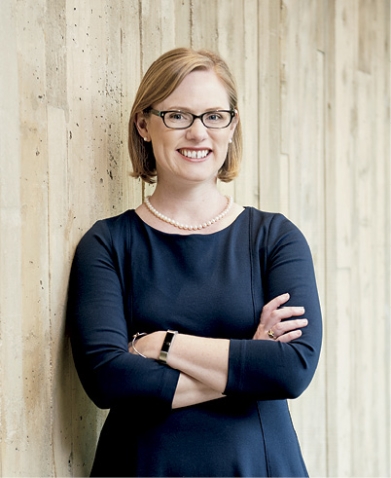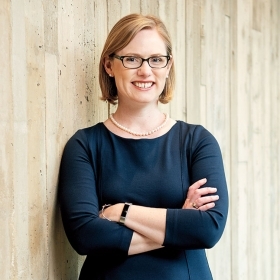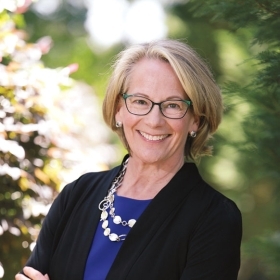“The best thing you can bring on this trip is your flexibility,” our tour manager announced on our first day together. I sat on a bus in Buenos Aires with 21 Wellesley alumnae, their guests, and Rachel Stanley, associate professor of chemistry and the Frost Associate Professor in Environmental Science at Wellesley. One bus ride, one flight, two days at sea, and a zippy Zodiac ride later, we arrived on the Antarctic Peninsula. That night, on New Year’s Day 2023, some of your fellow alums were jumping into the frigid waters for a “polar plunge” and, shaking off some seasickness, getting ready for the adventures ahead.
There was an anticipated itinerary, but weather and sea conditions around Antarctica change rapidly. The captain and crew explained that they would be opportunistic and responsive to the conditions, ensuring the best possible experience for travelers, rather than be tied to a particular route.
It worked. We had excursions every day, followed a pod of whales, explored historic sites and natural wonders, and delighted in thousands of penguins. Each evening, the crew debriefed us on what we had seen and changes in the next day’s itinerary. As a compulsive planner, it was a challenging and useful exercise in patience and flexibility for me.
A student recently told me that during her time at Wellesley, things in the world seem to be changing rapidly. She asked if this was because she’s expanding her horizons as a college student, or if everyone is experiencing a world in flux right now. I think it’s both. And for those of us who are planners and, honestly, people who are used to being “right” an awful lot, we are being forced out of our comfort zones.
I often think about the Wellesley College Alumnae Association’s organizational purpose and history in this context, and the need to be both driven by a steadfast mission and open to changing our methods and structures in ways that will allow us to achieve that mission most effectively.
The WCAA was established in 1880 by the first two graduating classes, of 1879 and 1880. At that time, the Wellesley College Board of Trustees was composed primarily of men. The WCAA was established as a separate entity in part to give alumnae a voice on matters concerning their alma mater. In 1886, the purpose of the WCAA was articulated: “Remembering the benefits we have received from our Alma Mater, we desire to extend the helpful associations of student life, and to maintain such relations to the College that we may effectively aid her in her up-building and strengthening to the end that her usefulness may continually increase.”
In 1889, the first alumna joined the board of trustees. Over the next 100 years, the process for electing alumnae trustees evolved and grew. Today, more than 80% of members of the board of trustees are alumnae, six elected directly by the WCAA. The others are often men who are “Wellesley adjacent”—relatives of alums. All board chairs since 1981 have been alumnae. The alumnae voice is the predominant governing voice of the College.
The alumnae relations function of the WCAA has also grown and evolved, with the consistent purpose “to extend the helpful associations of student life, and to maintain such relations to the College that we may effectively aid her in her up-building and strengthening … .” Our numbers have grown significantly since our founding in 1880, and our reach has extended globally. For 90 years, alumnae paid dues to the WCAA; now all alumnae are considered full members, and no dues are required for membership. Initially, the WCAA took up fundraising in support of specific College needs; in 1952, following the 75th anniversary campaign, fundraising was professionalized as an internal and essential College function.
Over the past few years, the WCAA board has been considering how we’ll best meet our mission in the decades ahead, and I’m grateful to them for that work. I’m bringing my best Antarctic flexibility, knowing that the stops along the way are likely to be different than those that were plotted out in 1880, 1952, or in any decade since. But I am confident that our intelligent, thoughtful, dedicated alumnae will pursue the best possible experience for Wellesley and one another, keep our mission in focus, and have some fun adventures along the way.








We ask that those who engage in Wellesley magazine's online community act with honesty, integrity, and respect. (Remember the honor code, alums?) We reserve the right to remove comments by impersonators or comments that are not civil and relevant to the subject at hand. By posting here, you are permitting Wellesley magazine to edit and republish your comment in all media. Please remember that all posts are public.